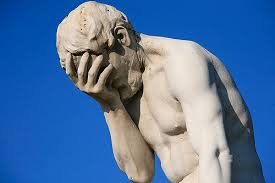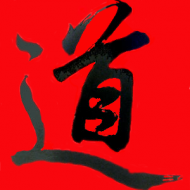
A failure of society or an extreme ego condition?
Last year there were 6,500 people who took their own lives in the UK.
The figures show that it was three times more likely to be a man, and amongst men we hear how high the suicide rate is for young men, but actually nearly quarter of all men were in their mid to late forties.
“Albert Camus posed one of the twentieth century’s best-known existentialist questions, which launches The Myth of Sisyphus: ‘There is only one really serious philosophical question, and that is suicide’, his philosophy of the absurd has left us with a striking image of the human fate: Sisyphus endlessly pushing his rock up the mountain only to see it roll back down each time he gains the top.” – (From Stanford Encyclopedia of Philosophy )
I feel certain, and without much knowledge on the subject that some of these poor souls are chemically imbalanced, pre-disposing themselves to this ultimate act.
One thing that one often hears about suicide is how shocked the people around the person who has taken their life were. It comes out of the blue for so many people. I guess on one level we don’t want to admit that we didn’t see it coming, but also most people are not highly enough trained to spot the indicators, and if somebody is really intent on ending it, not just showing disillusionment and calling for help, then they would naturally keep it well hidden to avoid being talked out of it.
So let’s look at Camus’ question. Essentially his core idea is that we have control over nothing in life except ourselves. I have written about control in the past, but the essential result of insecurity is the desire to try to control everything around one. The less you feel in control, the more you try to control. Suicide could be seen as the Ultimate act of control. In point of fact, the only thing you can control in your life is whether to live it to the full, or end it now.
Let’s examine why somebody might see this their only path.
I’ve been very lucky in my life, I would refer to my childhood as “Free range”
I was brought up in a time where there was no real “Stranger danger” – my parents operated a style of benign control. We were a big and privileged family, living in the Scottish countryside.
Not even the variable weather stopped us from roaming wild sometimes all day. Hunger was our only leash. Lunch or dinner would eventually reel us in from our adventures.
At school, there was a homogeneity, you were all in uniform, all encouraged (More or less) equally, and generally treated like a pack animal – fed, watered, exercised and then ignored.
It wasn’t until I was about 15 that I started to get a real sense of me. There was always an “Us” – a lovely, lively, chaotic bunch of friends, but essentially a bunch of children!
I remember on several occasions, around this age, being drawn into conversation by a friend of my parents’ and finding it odd that this grown man should assume that I had an opinion on something!
It was about this age that my brother discovered that I had a brain and some taste – which I too was only just discovering, he too took a small interest in me, most curious..
When I moved to South Africa in the 80’s – I was bewildered to find girls of 18 (I was only in my early 20’s) who were still mentally like children.
Generally South African public school girls (In the area that I lived in Johannesburg) were in school uniform, bare legged, approaching 6′ tall, tanned and lovely – and were ingénue. I’m sure if you were a school boy there at that time, you’d tell me different, but to my eyes, these girls were innocent and angelic, and about three years behind their European counterparts developmentally. I guess it’s all changed now, but it was both endearing and confusing for me!
I remember my Mum telling me that my father bought her, her first pair of stockings, and that right up to just before getting married, she was still wearing knee-socks!
My point in all of this is that our children grow up much faster. I remember playing an early video game with my young son, and being a bit horrified. He saw this expression and said “Don’t worry Dad, it’s not real!” – right there, in one generation, my children has sped ahead of me, developmentally! Their reality was one of violence on TV, in games and films, sex everywhere and the cheapness of life for all to see.
I spoke to one of my lovely Chinese teachers about just such a thing. He explained to me that the way we treat our children is changing rapidly. I China, for thousands of years the youngest in the family was the bottom of the pile, sometimes with livestock more highly prized!
There was a clearly defined pecking order, the scraps falling off the bottom, collected by the smallest child! Life has an inevitable path though, if you survive and thrive, you’ll finally rise to the top, and you’ll have others below you to pick up your scraps!
The idea of engaging children in conversation, and enquiring how they felt was a totally foreign idea. (Pretty much as it was for me – sure, my lovely mother would enquire if I was ok, but there was a sense of “Just get on with it…” in a kindly but serious way.
(Whenever we banged or grazed ourselves as children, my lovely father always used to say in his humorous way “If you are going to die, please just do it quietly!”)
So, in ancient China, one would only really develop a sense on “I” later on in life, as happened with me. We were brought up as pack animals, until we dared step into our own skins.
The suggestion here, as I’m sure you now see, is that we are pushed into our own skins at a very young age. “Are you OK?” – “What do you want?” – “Do you like this?” and “Are you happy?” are all regular features of parenting, where in the past they hardly featured at all.
The idea of the “pack and feral” upbringing was to help one to slowly find one’s place, and to gently develop one’s character, through trial and error.
To force this task on a two year old is nigh-on impossible. They don’t have the tools or the mental capacity.
So what occurs if this distortion is constantly put upon one?
Let’s imagine amping the situation up a little – an only child, whose parents have fought to conceive. The apple of Daddy’s eye, Mummies’ little soldier. Every twist and turn of our imaginary child’s life is examined, every day he’s asked about his emotions. He’s spoiled to within an inch of his life. He’s lead to believe that he’s the centre of the Universe.
Fast forward to the child as a father himself, his marriage failed, his dead end job, his children who no longer speak to him, and his dissolving waistline and clumps of hair on the pillow each morning. It’s all too evident that the lie that he was the centre of the Universe, has finally come to roost.
I expect the world will treat me well, I expect to get a good job, I expect a happy life, I expect to be healthy, wealthy and well. – WHY?
My lovely father instilled in me a HUGE sense of fairness – that I was to treat everybody fairly, I think a good personality trait – however it brings with it an expectation that everybody will treat you fairly, this is just NOT the case. Neither does life treat you fairly.
It all really depends on your expectations.
If you have low expectations of life, then something good will be a surprise, if you have high expectations, then something nice might not seems good enough for you!
These days we hear so much about the study of addiction also, people searching in vain for more money, more thrills, more happiness. (From a bottle, a pipe, a pill or a Vape) Modern research is beginning to show that it’s all just about triggering Dopamine or Noradrenaline – it’s a lifetime of missing the point, constantly searching for the next HIGH, and being LOW when we don’t get it. A lifetime of subjecting ourselves to being tossed on the high seas of emotion in search for lasting happiness and half drowning when we don’t find it.
It’s all about balance in a Qigong life, don’t go too high, or you’ll surely plunge down, don’t go to low, or you might never get back up – pitch life in the middle!
The Chinese farmer, who’s horse ran away – his neighbors said, what a shame!” – “he said maybe, maybe not…”
The next day the horse came back with a mare, his neighbors said “How amazing!” – “he said maybe, maybe not…”
The next day his son broke his leg training the Mare his neighbors said “How terrible!” – “he said maybe, maybe not…”
Next day the army rolled into town to take all the young men away to war, but the boy couldn’t go because of his broken leg…
You get the idea..
The cult of celebrity, the imagery of advertising and the pressure of society all pile on top of our “I’s” – we are set up to fail.
What’s left after abject failure?
What’s left when disillusionment strikes to the core of the soul?
What’s left when an inadvertently, now TOWERING, Ego comes crashing to the ground?
What control does one have left in a life that has spun crazily out of control?
I’m just sayin…
You know where my answers lie, it’s always Qigong, self-examination and stillness, and I’m always happy to talk about these things and help where I can. However this is a really tricky one, with no great answers..
Just speak to me first before you do anything we might all regret..
